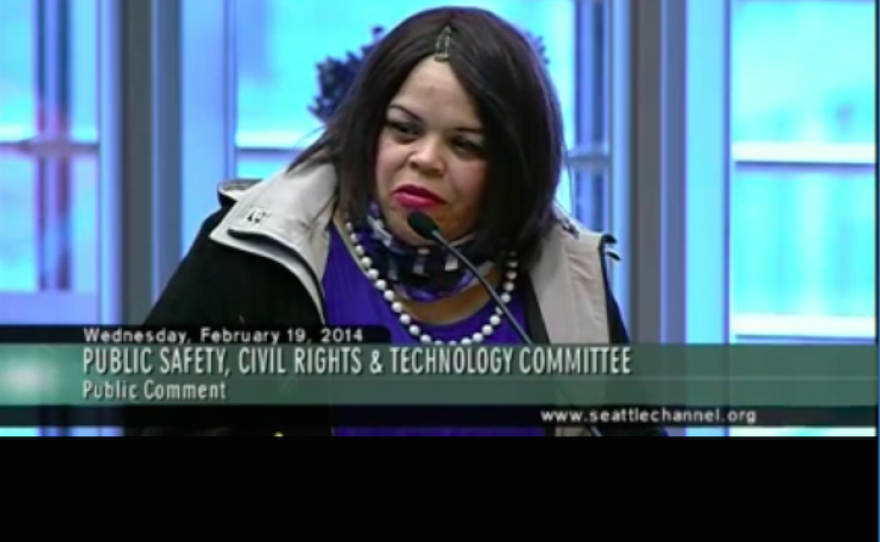They arrive at nearly every city or county council meeting. The regulars. The gadflies. The people who, no matter the topic, seize the microphone during the public comment period and say things like:
“You’re all criminals,” or “ I’m looking at you being an extraordinary, abusive, pathological liar,” or “I would think that this council would have some pretty high priced heads on spikes when all this clears.”
And so on.
While a member of the public has a right right to say such things – off-topic, on-point, sometimes insulting – that right isn’t unlimited. In the interest of civility, some local governments have been tightening the rules for public comment speakers.
It becomes a balancing act between protecting people’s free speech rights and moving a meeting along.
The Queen’s Gambit
Nearly an hour before a recent Seattle City Council meeting, people were already lining up to speak, including a woman who goes by the name Queen Pearl. She’s unemployed and says she’s been coming to these meetings for two years.
Her message is almost always on the same theme: Black lives matter.
But, even though she was number six on the sign up sheet council President Tim Burgess didn't call on her.
Queen Pearl: “See what they did? (I've been) in line since one o’clock .”
Council President Tim Burgess declines to talk about this or even about the public comment period in general—an indication that it’s a prickly topic in a city that prides itself on listening to everyone.
Queen Pearl says it’s not this way in other cities, and she should know-- she travels around.
“There’s a way that you can talk to somebody without zippin’ ‘em,” she said. “You go to Burien, those people are so polite, you go to Kirkland, you go to Bellevue.”
In the past year, the Seattle City council has passed rules allowing the council to ban people from meetings for up to 90 days for disruptive behavior.
That includes going over the two-minute time limit, refusing to stop talking or interrupting others. The King County Council has passed rules along the same lines.
The Zimmerman Effect
These increased restrictions in King County and Seattle are mainly in reaction to one person: Alex Zimmerman.
Alex Zimmerman brags that he’s spoken at more than 600 council meetings.
He comes to the mic with a battered red sign with an American flag and the words “Stand Up America” on it. What he says has to be censored.
Zimmerman: “Hi, my dirty f*****’ rats. Has this happened f*****’ before? Idiots.”
In addition to spewing obscenities, the 68-year-old Russian immigrant accuses council members of operating like the Gestapo or KGB. Outside Seattle Council chambers, Zimmerman said he swears as a counterbalance to all of the polite language.
“Yes, because everybody talkin’ nice, nice and nice and nothing happens, nobody change,” he said.
He says he values the freedom of speech in America, something he says he didn’t have in the Soviet Union.
Tom Rasmussen, a Seattle City Council member, said initially he found the language and vitriol shocking.
“Now I look for reaction from people in the audience who have never heard these people carry on like this and usually people jump.”
Rasmussen said Zimmerman’s use of the f-word didn’t prompt the new rules; swearing isn’t forbidden.
What the rules do require is that a speaker stays on topic. It’s those things, Rasmussen said, that have gotten Zimmerman banished multiple times.
“It has crossed the boundary of freedom of speech,” Rasmussen explained. “It is really disrupting the whole process as well as other people’s right to speak.”
What the American Civil Liberties Union have to say about all this?
Actually, the free speech advocates are fine with it. Aaron Caplan is a former ACLU attorney who teaches constitutional law at Loyola in Los Angeles. He said the constitutional guarantee of freedom of speech works a little differently depending on the situation.
“For example, if there’s a government run museum, they get to decide which paintings go up on the wall, you can’t just go put up your own paintings,” he said. “And similarly at a council meeting, the council can decide what its rules are in order to allow the meeting to go forward.”
But, he emphasized, the rules have to be viewpoint-neutral. A city can’t restrict speech based on someone’s opinion. In other words, you can regulate someone’s behavior but not what they say.
Tacoma Frequent Flyers
Derek Young has followed Tacoma City council meetings for 10 years for his blog, Exit 133.
“There are the regulars, the frequent flyers, the ones who are there on a regular basis,” he said.
But Young says he’s come to appreciate the public comment part of the meetings. Seeing both the Chamber of Commerce head and John Q. Citizen at the same mic is really what democracy is all about.
“By having the ability to have it be all open and all welcoming and if you can see the crazy and the good and the deliberate and the formal and the informal all coming to the same microphone, it seems more welcoming to me for anybody to be able to walk up to it,” he offered.









